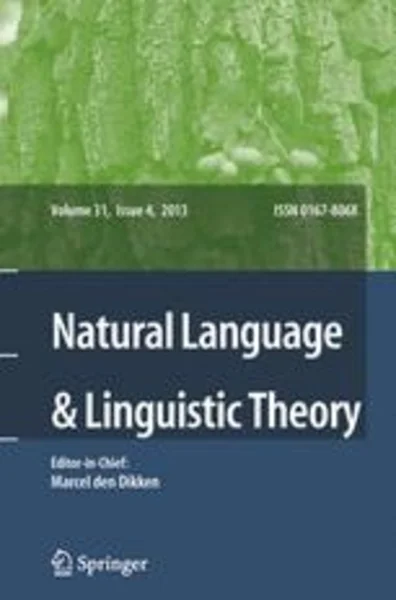-
binary tense and modality
جزئیات بیشتر مقاله- تاریخ ارائه: 1392/03/01
- تاریخ انتشار در تی پی بین: 1392/03/01
- تعداد بازدید: 384
- تعداد پرسش و پاسخ ها: 0
- شماره تماس دبیرخانه رویداد: -
the present paper adopts as its point of departure the claim by te winkel (1866) and verkuyl (2008) that mental temporal representations are built on the basis of three binary oppositions: present/past, synchronous/posterior and imperfect/perfect. te winkel took the second opposition in terms of the absence or presence of a temporal auxiliary zullen ‘will’. however, in a binary system future loses the status it has in a ternary analysis as being at the same level as past and present. the present paper shows that present and past already may express posterior information, there being no temporal role for zullen ‘will’. grice’s maxim of quantity determines which sort of interpretation (current or posterior) is to be associated with present or past. the infinitival form of zullen ‘will’ should be seen as an epistemic modal operator with a specific role in the interaction between speaker and hearer. this operator will be argued to be positioned between the first and the third opposition.
مقالات جدیدترین رویدادها
-
استفاده از تحلیل اهمیت-عملکرد در ارائه الگوی مدیریت خلاقیت سازمانی و ارائه راهکار جهت بهبود
-
بررسی تاثیر ارزش وجوه نقد مازاد بر ساختار سرمایه شرکت های پذیرفته شده در بورس اوراق بهادار تهران
-
بررسی تأثیر سطح افشای ریسک بر قرارداد بدهی شرکت های پذیرفته شده در بورس اوراق بهادار تهران
-
بررسی تأثیر رتبه بندی اعتباری مبتنی بر مدل امتیاز بازار نوظهور بر نقد شوندگی سهام با تأکید بر خصوصی سازی شرکت ها
-
تأثیر آمیخته بازاریابی پوشاک ایرانی بر تصویر ذهنی مشتری پوشاک ایرانی (هاکوپیان)
-
ارزیابی رابطه ژنتیکی بین گونه ای ارقام ( capsicum frutsicens و capsicum annuum ) با استفاده از نشانگر مولکولی issr
-
بررسی تاثیر تالک به همراه نانوسیلیس و میکروسیلیس بر بتن پودری واکنش پذیر
-
تحلیل و بررسی و مقایسه و تطبیق تزئینات شاه نشین در خانه های سنتی شهر اردبیل
-
چگونه توانستم اختلال در خواندن و نوشتن دانش آموزان راحله و مریم وامیر حسن را برطرف کنم
-
comparative performance evaluation of smes–smes, tcps–smes and sssc–smes controllers in automatic generation control for a two-area hydro–hydro system
مقالات جدیدترین ژورنال ها
-
مدیریت و بررسی افسردگی دانش آموزان دختر مقطع متوسطه دوم در دروان کرونا در شهرستان دزفول
-
مدیریت و بررسی خرد سیاسی در اندیشه ی فردوسی در ادب ایران
-
واکاوی و مدیریت توصیفی قلمدان(جاکلیدی)ضریح در موزه آستان قدس رضوی
-
بررسی تاثیر خلاقیت، دانش و انگیزه کارکنان بر پیشنهادات نوآورانه کارکنان ( مورد مطالعه: هتل های 3 و 4 ستاره استان کرمان)
-
بررسی تاثیر کیفیت سیستم های اطلاعاتی بر تصمیم گیری موفق در شرکتهای تولیدی استان اصفهان (مورد مطالعه: مدیران شرکتهای تولیدی استان اصفهان)
-
بازنمایی پوشاک دوره ساسانی، بر اساس مقایسه تطبیقی نقوش برجسته و ظروف
-
فراتحلیل مطالعات و تحقیقات رابطه بین فرهنگ سازمانی و رضایت شغلی
-
نانوکپسول های زیستی جهت جلوگیری از پوکی استخوان در فضانوردان در سفرهای فضایی
-
اجرای طرح آموزش و یادگیری آنلاین در مدارس استان اصفهان در دوران شیوع بیماری کووید-19
-
organization and design of city entrance with an emphasis on the space identity, case sample shiraz northern entrance




سوال خود را در مورد این مقاله مطرح نمایید :